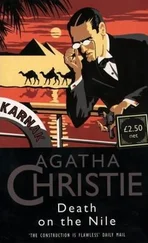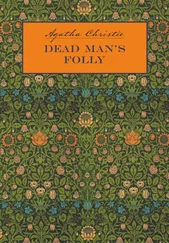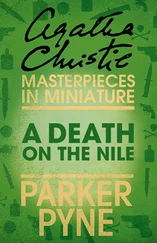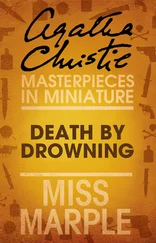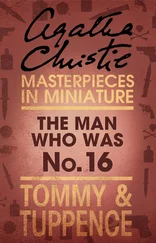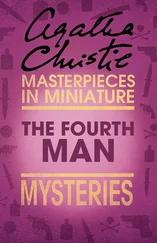Agatha Christie - Dead Man's Folly
Здесь есть возможность читать онлайн «Agatha Christie - Dead Man's Folly» весь текст электронной книги совершенно бесплатно (целиком полную версию без сокращений). В некоторых случаях можно слушать аудио, скачать через торрент в формате fb2 и присутствует краткое содержание. Жанр: Классический детектив, на английском языке. Описание произведения, (предисловие) а так же отзывы посетителей доступны на портале библиотеки ЛибКат.
- Название:Dead Man's Folly
- Автор:
- Жанр:
- Год:неизвестен
- ISBN:нет данных
- Рейтинг книги:5 / 5. Голосов: 1
-
Избранное:Добавить в избранное
- Отзывы:
-
Ваша оценка:
- 100
- 1
- 2
- 3
- 4
- 5
Dead Man's Folly: краткое содержание, описание и аннотация
Предлагаем к чтению аннотацию, описание, краткое содержание или предисловие (зависит от того, что написал сам автор книги «Dead Man's Folly»). Если вы не нашли необходимую информацию о книге — напишите в комментариях, мы постараемся отыскать её.
Dead Man's Folly — читать онлайн бесплатно полную книгу (весь текст) целиком
Ниже представлен текст книги, разбитый по страницам. Система сохранения места последней прочитанной страницы, позволяет с удобством читать онлайн бесплатно книгу «Dead Man's Folly», без необходимости каждый раз заново искать на чём Вы остановились. Поставьте закладку, и сможете в любой момент перейти на страницу, на которой закончили чтение.
Интервал:
Закладка:
"Mr Michael Weyman, M. Hercule Poirot," said Mrs Oliver.
The young man acknowledged the introduction with a careless nod.
"Extraordinary," he said bitterly, "the places people put things! This thing here, for instance. Put up only about a year ago – quite nice of its kind and quite in keeping with the period of the house. But why here? These things were meant to be seen – 'situated on an eminence' – that's how they phrased it – with a nice grassy approach and daffodils, et cetera. But here's this poor little devil, stuck away in the midst of trees – not visible from anywhere – you'd have to cut down about twenty trees before you'd even see it from the river."
"Perhaps there wasn't any other place," said Mrs Oliver.
Michael Weyman snorted.
"Top of that grassy bank by the house – perfect natural setting. But no, these tycoon fellows are all the same – no artistic sense. Has a fancy for a 'Folly,' as he calls it, orders one. Looks round for somewhere to put it. Then, I understand, a big oak tree crashes down in a gale. Leaves a nasty scar. 'Oh, we'll tidy the place up by putting a Folly there,' says the silly ass. That's all they ever think about, these rich city fellows, tidying up! I wonder he hasn't put beds of red geraniums and calceolarias all round the house! A man like that shouldn't be allowed to own a place like this!"
He sounded heated.
"This young man," Poirot observed to himself, "assuredly does not like Sir George Stubbs."
"It's bedded down in concrete," said Weyman. "And there's loose soil underneath – so it's subsided. Cracked all up here – it will be dangerous soon… Better pull the whole thing down and re-erect it on the top of the bank near the house. That's my advice, but the obstinate old fool won't hear of it."
"What about the tennis pavilion?" asked Mrs Oliver.
Gloom settled even more deeply on the young man.
"He wants a kind of Chinese pagoda," he said, with a groan. "Dragons if you please! Just because Lady Stubbs fancies herself in Chinese coolie hats. Who'd be an architect? Anyone who wants something decent built hasn't got the money, and those who have the money want something too utterly goddam awful!"
"You have my commiserations," said Poirot gravely.
"George Stubbs," said the architect scornfully. "Who does he think he is? Dug himself in to some cushy Admiralty job in the safe depths of Wales during the war – and grows a beard to suggest he saw active naval service on convoy duty – or that's what they say. Stinking with money – absolutely stinking!"
"Well, you architects have got to have someone who's got money to spend, or you'd never have a job," Mrs Oliver pointed out reasonably enough. She moved on towards the house and Poirot and the dispirited architect prepared to follow her.
"These tycoons," said the latter bitterly, "can't understand first principles." He delivered a final kick to the lopsided Folly. "If the foundations are rotten – everything's rotten."
"It is profound what you say there," said Poirot. "Yes, it is profound."
The path they were following came out from the trees and the house showe white and beautiful before them in its setting of dark trees rising up behind it.
"It is of a veritable beauty, yes," murmured Poirot.
"He wants to build a billiard room on," said Mr Weyman venomously.
On the bank below them a small elderly lady was busy with sécateurs on a clump of shrubs. She climbed up to greet them, panting slightly.
"Everything neglected for years," she said. "And so difficult nowadays to get a man who understands shrubs. This hillside should be a blaze of colour in March and April, but very disappointing this year – all this dead wood ought to have been cut away last autumn -"
"M. Hercule Poirot, Mrs Folliat," said Mrs Oliver.
The elderly lady beamed.
"So this is the great M. Poirot! It is kind of you to come and help us tomorrow. This clever lady here has thought out a most puzzling problem – it will be such a novelty."
Poirot was faintly puzzled by the graciousness of the little lady's manner. She might, he thought, have been his hostess.
He said politely:
"Mrs Oliver is an old friend of mine. I was delighted to be able to respond to her request. This is indeed a beautiful spot, and what a superb and noble mansion."
Mrs Folliat nodded in a matter-of-fact manner.
"Yes. It was built by my husband's great-gandfather in 1790. There was an Elizabethan house previously. It fell into disrepair and burned down in about 1700. Our family has lived here since 1598."
Her voice was calm and matter of fact. Poirot looked at her with closer attention. He saw a very small and compact little person, dressed in shabby tweeds. The most noticeable feature about her was her clear china-blue eyes. Her grey hair was closely confined by a hair-net. Though obviously careless of her appearance, she had that indefinable air of being someone which is so hard to explain.
As they walked together towards the house, Poirot said diffidently, "It must be hard for you to have strangers living here."
There was a moment's pause before Mrs Folliat answered. Her voice was clear and precise and curiously devoid of emotion.
"So many things are hard, M. Poirot," she said.
Chapter 3
It was Mrs Folliat who led the way into the house and Poirot followed her. It was a gracious house, beautifully proportioned. Mrs Folliat went through a door on the left into a small daintily furnished sitting-room and on into the big drawing-room beyond, which was full of people who all seemed, at the moment, to be talking at once.
"George," said Mrs Folliat. "This is M. Poirot who is so kind as to come and help us. Sir George Stubbs."
Sir George who had been talking in a loud voice, swung round. He was a big man with a rather florid red face and a slightly unexpected beard. It gave a rather disconcerting effect of an actor who had not quite made up his mind whether he was playing the part of a country squire, or of a "rough diamond" from the Dominions. It certainly did not suggest the navy, in spite of Michael Weyman's remarks. His manner and voice were jovial, but his eyes were small and shrewd, of a particularly penetrating pale blue.
He greeted Poirot heartily.
"We're so glad that your friend Mrs Oliver managed to persuade you to come," he said. "Quite a brain-wave on her part. You'll be an enormous attraction."
He looked round a little vaguely.
"Hattie?" He repeated the name in a slightly sharper tone. "Hattie!"
Lady Stubbs was reclining in a big arm-chair a little distance from the others. She seemed to be paying no attention to what was going on round her. Instead she was smiling down at her hand which was stretched out on the arm of the chair. She was turning it from left to right, so that a big solitaire emerald on her third finger caught the light in its green depths.
She looked up now in a slightly startled childlike way and said, "How do you do."
Poirot bowed over her hand.
Sir George continued his introductions.
"Mrs Masterton."
Mrs Masterton was a somewhat monumental woman who reminded Poirot faintly of a bloodhound. She had a full underhung jaw and large, mournful, slightly bloodshot eyes.
She bowed and resumed her discourse in a deep voice which again made Poirot think of a bloodhound's baying note.
"This silly dispute about the tea tent has got to be settled, Jim," she said forcefully. "They've got to see sense about it. We can't have the whole show a fiasco because of these idiotic women's local feuds."
"Oh, quite," said the man addressed.
"Captain Warburton," said Sir George.
Captain Warburton who wore a check sports coat and had a vaguely horsy appearance, showed a lot of white teeth in a somewhat wolfish smile, then continued his conversation.
Читать дальшеИнтервал:
Закладка:
Похожие книги на «Dead Man's Folly»
Представляем Вашему вниманию похожие книги на «Dead Man's Folly» списком для выбора. Мы отобрали схожую по названию и смыслу литературу в надежде предоставить читателям больше вариантов отыскать новые, интересные, ещё непрочитанные произведения.
Обсуждение, отзывы о книге «Dead Man's Folly» и просто собственные мнения читателей. Оставьте ваши комментарии, напишите, что Вы думаете о произведении, его смысле или главных героях. Укажите что конкретно понравилось, а что нет, и почему Вы так считаете.


